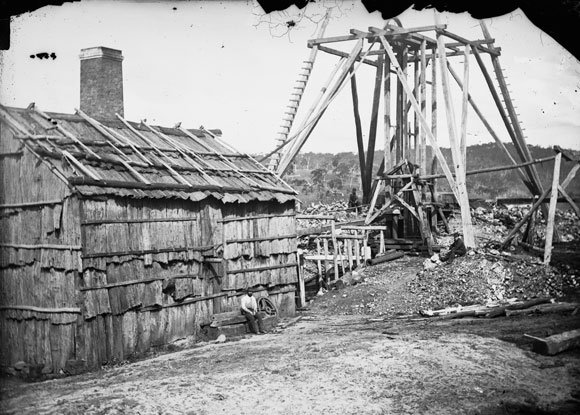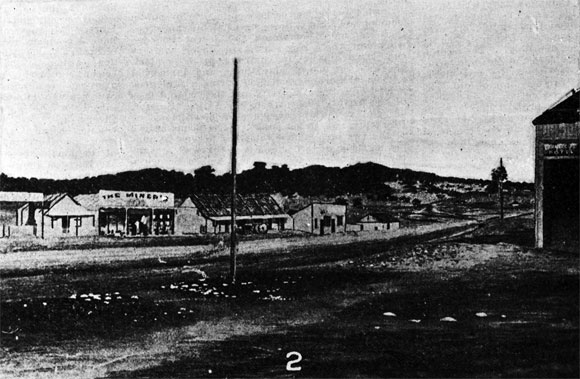Lucknow, 1861 to 1878
“Lucknow is a mining township, consisting of in all some one thousand and thirty-three acres, only a very small portion of which so far has been actually mined upon. Untouched, there are some eight hundred odd acres of rich agricultural land securely fenced and permanently watered.”
In December 1836 Andrew Kerr outbid Charles Wentworth at the crown auction for a portion of land containing 1,195 acres in the Orange Parish. He named his holding ‘Wellwood’, after his family’s farm in Scotland. Kerr was a successful farmer and open to the possibilities of gold mining on his property and he, like Wentworth, permitted prospecting in the early 1850s.
The combination of good farming land and mineral potential encouraged Wentworth’s neighbour Andrew Kerr, to purchase a portion of the Wentworth Gold Field Company in January 1861. Kerr then sold the land at the same price to an ambitious young surveyor, Edward Coombes. In 1862 Coombes made available the most promising gold-bearing land in Lucknow. Coombes sold licenses to the prospectors, just as Wentworth had issued his own licenses earlier in 1851.
The dry weather did not make prospecting easy in 1862. Among the hopefuls was a young Henry Newman, who became known as the ‘Rajah of Lucknow’. He made a lucky strike at his Homeward Bound Shaft, close to the present Wentworth Main, but on the opposite side of the main road.
At the end of the year, other mines nearby, prospered from 1863-1864. These included: Spicer’s, Golden Gate, Crinoline, Happy Go Lucky, Industry Rewarded, Perseverance, Snobs, Uncle Tom and various leads on Chapel Hill.
Frost was a good citizen and generous with his fortune. He donated money to churches of various denominations and assisted in the infrastructure for Lucknow to develop as a service town. Frost retained sole ownership of the Lucknow Estate for almost twenty years; he sold it in 1882. Until his death in 1888, he resided in his grand house in Orange, now part of Kinross–Wolaroi School.

An early mine-shaft and winding-house made of bark with a brick chimney beyond, photographed by Beaufoy Merlin in April 1873. It is plausible from the terrain and the alignment of the hills on the horizon that this shaft was located on or near the Wentworth Main site. The date is known from Keast Burke, Gold and Silver, Heinemann, 1973.
Image courtesy Mitchell Library, State Library of NSW, Holtermann Collection 1/162.
The opening of the Reform Mine in 1873, owned by Sydney merchant, Charles Moore, was the most significant mining development of the 1870s in the village, but the potential of this shaft was not realised until Henry Newman bought the mine in 1878. This purchase opened the next phase in the development of the village, establishing the Wentworth Main Shaft as a key factor in the field’s success or failure.
The north-easterly sector of the site, which had attracted the earliest gold prospectors, remained the focal point of Lucknow as described by a newspaper account in the early 1880s.

Is it possible please to establish from Council archives and other historical records, how Lucknow came about its name and how it is correctly pronounced. There is reference on the web to correspondence from the 1850’s to the town spelt as Luck-now, yet some in the present day insist it is named and pronounced after the town of Lucknow in India, and thus, ‘Luck know’. This belief may be founded on the nick name of Henry Newman, one of the pioneers of the village, as the ‘Rajah of Lucknow’. Clearly, the name itself (i.e., Lucknow) was already in existence before he acquired his psuedonym. I believe the correct pronounciation of the village needs to be defined in order to correctly preserve the heritage of the area and if this is available via Council records, I would be extremely grateful.
Sincerely,
Jeff Mack